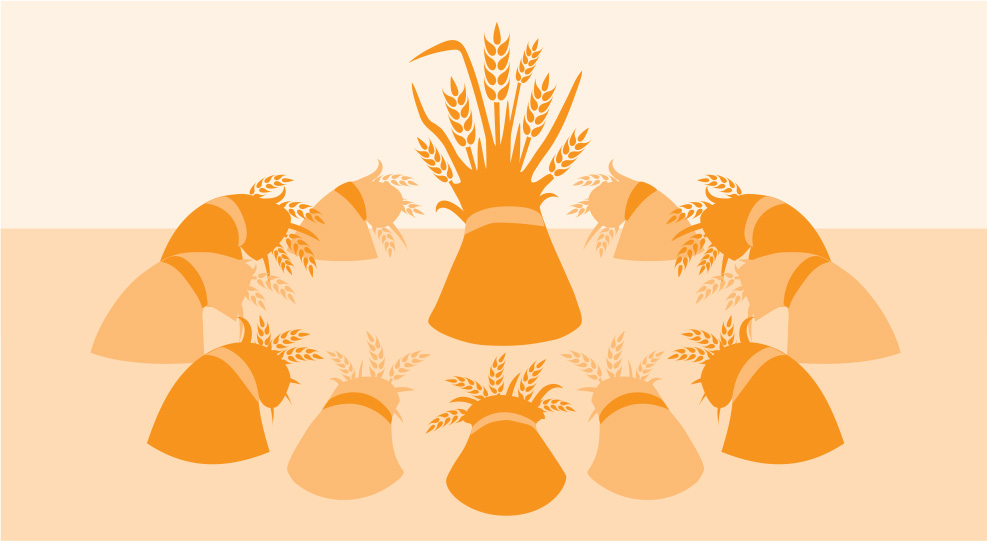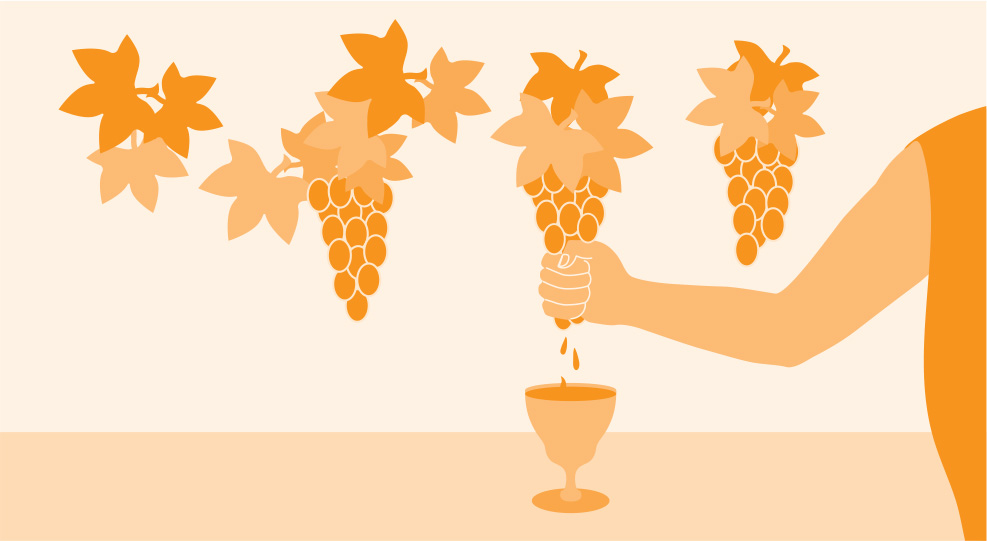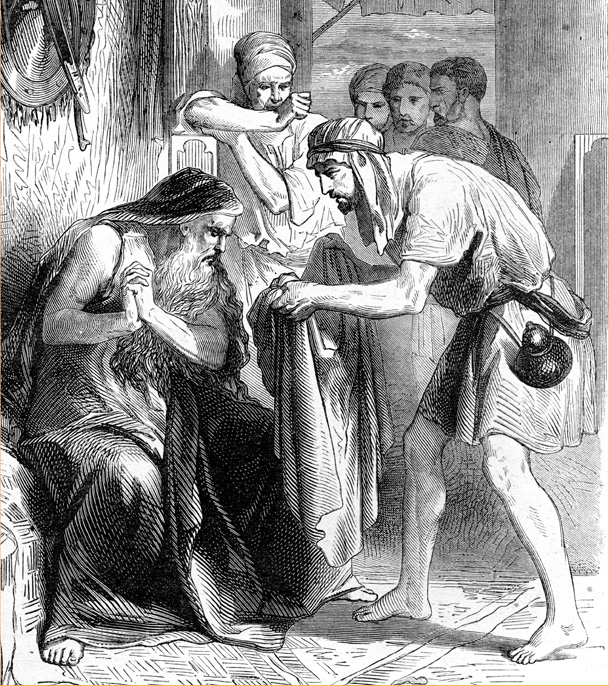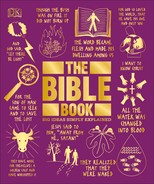
IN BRIEF
Genesis: 37:1–50:26
Dreams and their interpretation
2000–1600 BCE Canaan and Egypt.
Jacob A patriarch, who is also called Israel.
Joseph Jacob’s favorite son, born to Rachel.
Reuben and Judah Joseph’s half-brothers.
Pharaoh Ruler of Egypt.
Potiphar Captain of Pharaoh’s guard.
The second youngest of Jacob’s 12 sons, and the patriarch’s favorite, Joseph is celebrated in Genesis as a dreamer. Through keeping faith with the messages of his divinely inspired dreams, Joseph rises to become chief adviser to the Egyptian Pharaoh and brings his family, destined to found the 12 tribes of Israel, into Egypt.
Joseph’s story is a continuation of the history of the Israelites’ ancestry, with divine calls and promises, but God is less obviously present than in earlier stories. Here, the emphasis is on the importance of forgiveness and reconciliation.
The meaning of dreams
From a young age, Joseph believes that his dreams contain messages about future events. However, his brothers see Joseph’s narration of his dreams as boastful. In his first dream, Joseph sees himself and his brothers binding sheaves of wheat in the fields. While his sheaf stands upright, the sheaves of his brothers bow down before his sheaf. The unwelcome message of Joseph’s dream—at least to his brothers—is that Joseph is destined to rule over them. Their unease is reinforced when Joseph dreams that the sun and moon, representing his father and mother, and 11 stars (his brothers) pay homage to him. Even Jacob is bemused by this and scolds Joseph: “What is this dream you had? Will your mother and I and your brothers actually come and bow down to the ground before you?” (Genesis 37:10).

Prophetic dreams in the Bible
God employs dreams and visions throughout the Bible as a way of revealing and furthering his divine plan. These dreams act as a bridge between God and man. In Genesis 15:1, as Abraham falls into a deep sleep, God uses a vision to restate His covenant with Abraham. Later on in the Old Testament, Samuel, Solomon, and Daniel are all noted dreamers. Samuel has his first vision as a young boy in 1 Samuel: 3, when “the Word of the Lord was rare; there were not many visions,” and in 1 Kings: 3:5, Solomon dreams that God invites him to choose a gift (Solomon asks for a discerning heart to help him “distinguish between right and wrong.”) In Daniel 7, Daniel is terrified by a vision of four great beasts that represent four future kingdoms, which will only give way to the Son of Man.
Plot against Joseph
In Genesis 37:13, when Joseph’s older brothers are out grazing their flocks, Jacob sends Joseph to check on them. The brothers decide to take advantage of Joseph’s visit to the remote location to murder him and thus prevent his dreams from coming true. However, Reuben, Jacob’s firstborn, opposes this proposal and argues against killing Joseph outright. He recommends that they strip Joseph of his ornate coat, which is a gift from their father, and throw him into a cistern to die naturally. (Reuben secretly plans to rescue Joseph when his brothers’ backs are turned.) However, another brother, Judah, also troubled by the idea of killing their own flesh and blood, suggests selling Joseph to a passing group of Midianite traders for 20 silver shekels. The brothers follow Judah’s plan and also dip Joseph’s robe in goat’s blood to pretend to their father that their brother has been killed by a wild animal.
Pharaoh’s Egypt
Ancient Egypt was a sharply segregated society. At the top stood the pharaoh, not just as a king, but as an incarnation of divine power. Below the pharaoh came the nobles and then the priests; at the bottom were the farmers and slaves, the largest group.
Although the country was mainly desert, agriculture along the Nile valley created enormous wealth for ancient Egypt. The unusual fertility of the Nile valley was due to the akhet (the annual inundation), when the Nile floods. The silt left behind enriched the soil, leading to abundant harvests. Tax on this bounty created immense wealth for Pharaoh and the nobles.
Hapi, the Nile god, and Osiris, god of life, received hymns and offerings to ensure the inundation. These gods were among more than 2,000 in ancient Egypt, including Anubis, god of the underworld, Isis, goddess of love, and the sun god Ra. It is not known to what extent the Israelites in Egypt embraced these gods or stayed true to their one God.




Fortunes in Egypt
The Midianites sell Joseph on to Ishmaelites traveling to Egypt, who, in turn, sell him into slavery in the house of Potiphar, the captain of Pharaoh’s guard. Joseph serves his master well and is soon in charge of the entire household. However, when Potpihar’s wife falsely accuses Joseph of seducing her, Potiphar throws him in prison. As Joseph stays true to his faith by resisting sexual temptation, God does not desert him in his suffering. He is put in charge of the other prisoners, and interprets the dreams of two of them—Pharaoh’s chief cupbearer and head baker. He tells them that in three days the baker will be put to death, while the cupbearer will be pardoned. When his predictions come true, Joseph asks the cupbearer to put in a good word for him with Pharaoh, which he promises to do.
However, the cupbearer, unlike God, is fallible and forgets his promise until two years later, when Pharaoh begins to have strange dreams. In the first dream, seven sickly cows devour seven healthy ones as they graze beside the Nile. In the second, seven sickly ears of grain swallow seven fat ones. At this point, the cupbearer remembers Joseph. Hearing the cupbearer’s story, Pharaoh has Joseph brought before him.
Joseph is quick to explain the meaning of Pharaoh’s dream, while also being careful to stress that he is simply an instrument of God and that the dreams are a sign of God’s purpose. He tells Pharaoh that his dreams signify seven years of plenty followed by seven years of famine. He advises Pharaoh to store supplies of grain during the years of plenty in order to use them later. Pharaoh takes Joseph’s advice and appoints him as his chief adviser.

The legacy of Joseph
Joseph’s tale does not end here. Eventually, he is reconciled with his brothers, who, during the years of famine, are sent to Egypt by Jacob to buy grain. Joseph forgives his brothers, believing it is thanks to their earlier wrongdoings that he is able to feed them in their time of need. “God sent me before you to preserve life,” he pronounces in Genesis 45:5. Pharaoh allows Joseph to bring Jacob and his people to Egypt, where they prosper. They remain there until, generations later, a new pharaoh, “to whom Joseph meant nothing” (Exodus 1:8), comes to the throne.
Joseph devotes his life to serving others. He always credits God for his achievements and remains faithful to Him. His story, which is also chronicled in the Qur’an, which regards him as a prophet, illustrates the power of forgiveness. Crucially for the next book in the Bible, the story also explains how the Israelites came to be in Egypt.
“The dreams of Pharaoh are one and the same. God has revealed to Pharaoh what he is about to do.”
Genesis 41:25

See also: Covenants • Esau and Jacob • Jacob Wrestles with God • The Wisdom of Solomon • Daniel in Babylon
